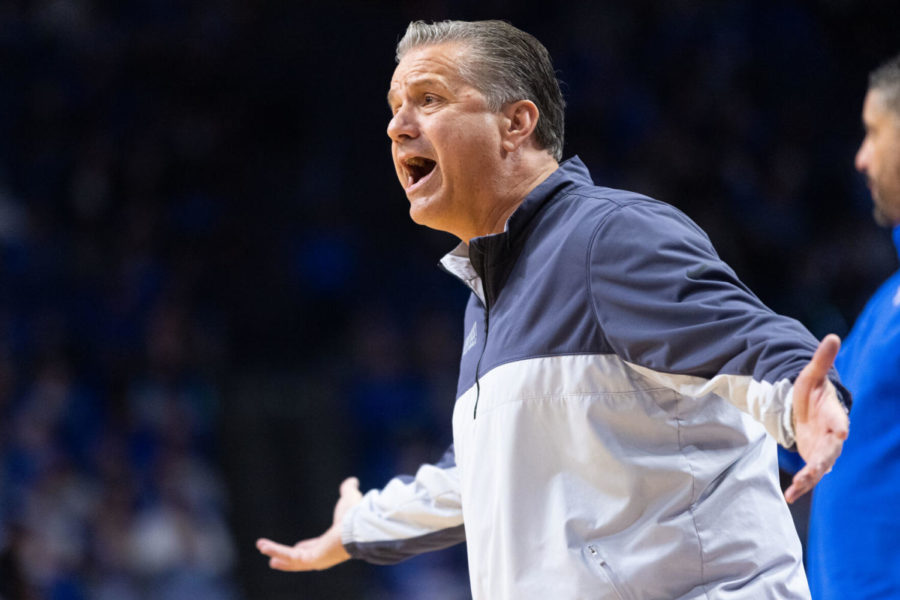Kentucky/SEC update COVID protocols amidst surge of omicron variant in US
Kentucky Wildcats head coach John Calipari yells at an official during the UK vs. Miles College men’s basketball game on Friday, Nov. 5, 2021, at Rupp Arena in Lexington, Kentucky. Kentucky won 80-71. Photo by Michael Clubb | Staff
January 13, 2022
Amidst the surge of COVID-19 cases in the U.S., the SEC and University of Kentucky have updated their health and safety protocols.
The increase in cases comes as the omicron variant made it to the U.S. in late 2021. Since its arrival, college sports, including both mens and womens basketball and college football, have seen postponements and cancellations in high numbers.
On the college football front, at least five college bowl games were cancelled, prematurely ending the seasons of several programs, and several other teams had to be replaced after dropping out of their bowl game. Narrowing in on the SEC, Texas A&M was forced to remove itself from the Gator Bowl against No. 17 Wake Forest and had to be replaced by Rutgers.
The Wildcats themselves faced COVID-19 challenges in their Citrus Bowl performance against Iowa, having to play without multiple key players due to “injuries and health and safety protocol,” according to Kentucky Football’s Twitter page.
Despite the issues, college football was able to wrap up its bowls without altering its policies, but college basketball and other spring sports don’t have that luxury.
The unprecedented number of cases has resulted in most conferences, including the SEC, being forced to revise their initial COVID-19 policies for the basketball and upcoming spring seasons.
The conference announced that teams are required to play any game on their schedule as long as they have at least seven scholarship athletes and one member of the coaching staff available. The decision was made to help calm the concerns of multiple college coaches that teams may “duck” or avoid playing teams they don’t believe they can beat. Teams also have the option to play with fewer players if they choose to.
If a team is unable to put forth seven scholarship players and one coach and do not believe they can play, the game will be declared a no-contest and will not result as a win or loss for either team.
This rule is a change from the original plan when the season started, which was that any team unable to play for COVID-19 concerns would be forced to forfeit the game, which would count as a loss in conference standings. Forfeits will no longer be present with the new rules. Schools will be able to ask for a postponement if possible, but if the event is unable to be rescheduled, it will be a no-contest.
“As we have done since the onset of the pandemic, we continue to evaluate our policies and procedures related to COVID-19 based on the most current information,” SEC commissioner Greg Sankey said on Dec. 23. “Circumstances have clearly changed since our interrupted game policy was implemented in August and this updated approach is intended to support healthy, fair, and equitable competition.”
Both Kentucky mens and womens basketball have had several events altered or postponed due to COVID-19 cancellations. As both teams move into conference play, the new policies will likely be put to the test as game cancellations have yet to show any sign of slowing down.
The womens’ team specifically has had a matchup against Mississippi State postponed on two separate occasions. The two teams were supposed to play on Jan. 2 and later on Jan. 13, but neither time panned out for one team or the other.
Mens basketball head coach John Calipari has emphasized the importance of booster shots to his team as a means to prevent breakthrough cases and spread within the program.
“My hope is that we are able to mitigate [the effect] if folks will get the booster,” Calipari said on Dec. 18. “Last year was the most miserable thing I’ve ever been through. My whole worry was keeping guys safe. [The coaches] are going to talk [to the players] about it. I’d like them to get boosters. I did it.”
As of now, the mens team has not had to alter an event due to positive cases within its program. The womens team has only had to postpone one event, its Jan. 3 game against Mississippi State, due to cases within the program.
































































































































































